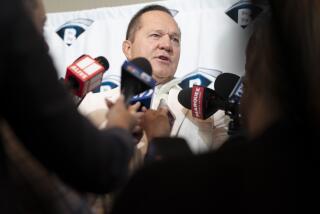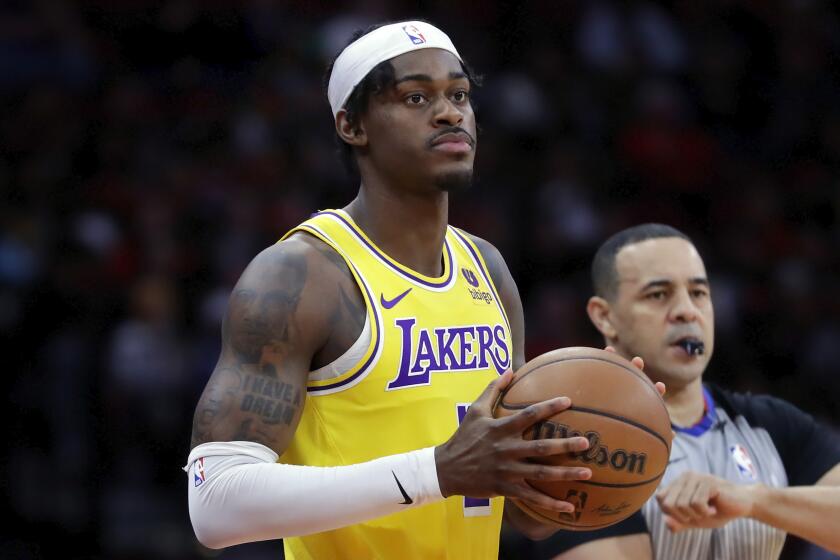Knight Flew the Coop in New York, Landed in Baltimore as an Oriole
- Share via
MIAMI — Drenched with champagne, an exhilarated Ray Knight stood in the clubhouse of the New York Mets on the night of Oct. 27 and said that as close as he had come to his “death in baseball” this was all hard to believe.
“It’s not even a dream come true because to have dreamt this would have been too far-fetched,” he said.
He had just emerged from the 1986 World Series as the Most Valuable Player, having batted .391. In the two final games, he had five hits, one a home run, and drove in three runs.
It was a stunning climax to a season in which the third baseman led the Mets in batting at .298, drove in 76 runs and played an aggressive and combative leadership role on a team that won 108 regular-season games.
All of that after that brush with career death.
Hounded by injuries in his first two years with the Mets and dissatisfied with his use as a role player, a platoon partner of Howard Johnson at times, Knight considered quitting after the 1985 season but was encouraged to continue by his wife, golfer Nancy Lopez.
“For two years I was booed off the streets of New York,” Knight said the night of his World Series triumph. “I didn’t even feel like I was part of the club. The press was calling me Ray Lopez and wondering how the Mets could take me to camp again as the possible third baseman.
“I didn’t even want to go, but Nancy gave me the urging and support I needed. She believed I could win the job, though I tried to tell her there was just no way. I still thought I could play, I just didn’t think I’d get the chance.”
Knight got the chance, won the job and took off on the dream that was too far fetched.
And now?
Now the 34-year-old Knight is in spring training at Miami Stadium on the east coast of Florida while the Mets train at St. Petersburg on the west coast.
Now Knight is preparing for his 11th major league season and first as the third baseman of the Baltimore Orioles, the only team to bid for his services after the Mets had rejected his contract demands.
“As much as being the Series MVP meant to me personally, it proved to be insignificant to the Mets, and I wasn’t surprised by that,” Knight said. “Despite the kind of year I had, the only thing I kept hearing was that they wanted Kevin Mitchell or Howard Johnson or Dave Magadan to play third eventually.
“I never had the feeling that the Mets wanted me back, and no one ever said anything to me that made me feel otherwise. I mean, once we got into the negotiations I wasn’t surprised by the course they took. My feeling was that they were only making me an offer to save face. I had the feeling that they thought they were doing me a favor.”
Having made $645,000 in 1986 and eligible for free agency when the season ended, Knight put his priority on a two-year contract, at the end of which he would retire.
His son will be 9 then and starting Little League, his daughter will be 5 then and starting kindergarten, and Knight said it would be time then for him to take over their supervision while his wife continues her career as a golfer.
The Mets flatly rejected two years and offered one at $800,000.
“Nancy and I liked New York and were prepared to buy a home there,” Knight said. “But I didn’t want to play one year in New York and then go somewhere else. There was no sense of permanency in a one-year contract.
“I explained to the Mets why I wanted two, but they thought it was a ploy. They didn’t understand my roots and convictions.”
Mets’ General Manager Joe McIlvaine said that the club approached the negotiations with the feeling that Dave Magadan, 24, who hit .311 at Tidewater, was their third baseman of the future and that Howard Johnson’s presence allowed them to break Magadan in slowly.
Said McIlvaine: “Three of Knight’s last six seasons had been tainted by injuries and two of his three with us were substandard. We believe that in order to upgrade the organization, we have to constantly try to move up the young players.”
McIlvaine added that Knight’s emphasis on a two-year contract, unacceptable to an organization rich in young talent, soon switched to a seven-figure salary, equally unacceptable.
Knight said: “My price was two years but when I realized I’d have to bite the bullet on that, I (asked for more money) because I was hurt. I know what I contributed last year. I contributed as much as the two guys (Keith Hernandez and Gary Carter) who each make close to $2 million a year.
“There’s only two ways a club can demonstrate how much you mean to it. One is by length of contract and the other by salary. The Mets showed me no respect on either count.”
Knight knew what he would find in free agency, knew he would have to accept less than the Mets’ offer of $800,000.
As a resident of Albany, Ga., he was hoping the Atlanta Braves would be interested. He hoped that two or three teams would bid, invigorating the depressed market.
Only the Orioles made an offer.
“I learned quickly that there is no free agency, that the door is shut,” he said. “Several clubs said they were interested but had to check out some things first. It was as if they were reading from a script. Several clubs said they didn’t want to give up the compensation, even though I was only a Class B free agent.
“I couldn’t believe it. I’m a proven commodity. You mean you’re not going to take a run at winning a pennant just because you don’t want to give up a draft choice or minor league player?”
Knight again put an emphasis on two years. The Orioles offered one at $425,000. Knight set a bottom line of $500,000. They talked about the possibility of an option year.
On Feb. 11, deadline day for both sides, the Orioles were offering $475,000 for 1987 with an option on ’88 at $550,000. Knight called owner Edward Bennett Williams directly and said he couldn’t play for less than $500,000.
Williams, painfully aware that his team used 10 third baseman in 1986 who had made 40 errors while driving in only 50 runs, said he would give Knight $500,000 if Knight would agree to take $25,000 less in the option year.
Knight agreed. Thus, he will make $500,000 this year and another $525,000 next year, which he qualifies for if he appears in 120 games this year or has 450 plate appearances.
He can also make another $275,000 a year on incentives based on games played, plate appearances and awards.
“No one feels good about selling himself for less than his market value, and I don’t think $500,000 represents my market value,” Knight said. “But I can live on $500,000. I also have an easy opportunity to get the two years I wanted by playing in 120 games.
“That’s the amazing thing about baseball. I haven’t done anything for the Orioles and they’ve given me an easy opportunity to get the two years. I did a lot for the Mets, and they wouldn’t.”
More to Read
Go beyond the scoreboard
Get the latest on L.A.'s teams in the daily Sports Report newsletter.
You may occasionally receive promotional content from the Los Angeles Times.









